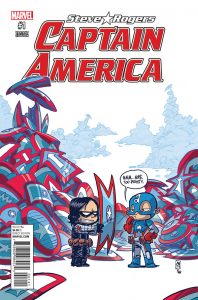 So, as the last comic book fan with a blog to express an opinion about Captain America: Steve Rogers No.1, I thought it’s probably necessary that I have a suitably clickbait-style headline so that people might pay some attention. For what it’s worth, though, I do believe that the current treatment of Peter Parker is worse (more disrespectful to the character, less interesting and less smart) than what appears to be in store for Steve Rogers, and I’ll come back to that at the end. On this new Captain America, I think that some of the reaction to what is, after all, the first chapter of what seems planned to be an extended story has been ludicrous. And some of the responses to the fact that Captain America utters the dread phrase “Hail Hydra” (and seems to mean in) in the final panel seem to have missed or deliberately ignored everything else on all the other pages of the book. In fact, given the approach to extremism displayed so far, I’m quietly hopeful that this comic is going to go somewhere worthwhile and, perhaps, will deal with extremism in an interesting way rather than blandly restate the usual vapid comic book platitudes. I have three main points: that doesn’t sound much, but I do like to go on, so this is a long read. The tl:dr version is: (i) this comic book shows signs that it understands what modern extremism really looks like and is not just regurgitating the usual comic book tropes; (ii) it’s good that author Nick Spencer appears willing to question the notion that anyone might be incorruptible; and (iii) it’s not an insult to Cap’s Jewish creators to use him to warn people about the insidiousness of extremist ideas, especially in today’s world. If you want the full argument, read on.
So, as the last comic book fan with a blog to express an opinion about Captain America: Steve Rogers No.1, I thought it’s probably necessary that I have a suitably clickbait-style headline so that people might pay some attention. For what it’s worth, though, I do believe that the current treatment of Peter Parker is worse (more disrespectful to the character, less interesting and less smart) than what appears to be in store for Steve Rogers, and I’ll come back to that at the end. On this new Captain America, I think that some of the reaction to what is, after all, the first chapter of what seems planned to be an extended story has been ludicrous. And some of the responses to the fact that Captain America utters the dread phrase “Hail Hydra” (and seems to mean in) in the final panel seem to have missed or deliberately ignored everything else on all the other pages of the book. In fact, given the approach to extremism displayed so far, I’m quietly hopeful that this comic is going to go somewhere worthwhile and, perhaps, will deal with extremism in an interesting way rather than blandly restate the usual vapid comic book platitudes. I have three main points: that doesn’t sound much, but I do like to go on, so this is a long read. The tl:dr version is: (i) this comic book shows signs that it understands what modern extremism really looks like and is not just regurgitating the usual comic book tropes; (ii) it’s good that author Nick Spencer appears willing to question the notion that anyone might be incorruptible; and (iii) it’s not an insult to Cap’s Jewish creators to use him to warn people about the insidiousness of extremist ideas, especially in today’s world. If you want the full argument, read on.
My first reason for hope for this series is the excellently written, horrible but wholly credible portrayal of the Red Skull as a modern demagogue. Over the years, Skull has mostly been written as an empty symbol of generic “evil” – it was enough that he was a NAZI and that NAZIS were bad, like monsters that lived under a child’s bed. The Red Skull has, in most of his comic book appearances, most often represented a lazily undefined “badness” – evil, yes, but evil in the way Dr Doom is “evil” or “MODOK” is evil or evil in the way some guy Moon Knight punches because he’s trying to steal a mystic gem that will give him the power to give everyone on the planet very bad indigestion is evil. Comic book evil. Silly evil. And, of course, fascists and Nazis are not “silly evil”. And portraying a fascist like Skull that way may not have been a particular problem when the attitudes associated with fascism seemed permanently in retreat – condemned to the fringes of society and a handful of “inconsequential”, far away nations.
But that’s no longer the case.
In Europe the far right are winning votes and seem to be growing more influential at every election while those fleeing poverty, persecution and horrific wars are demonised, their desperate need for help used as fuel by those seeking to generate and channel the fear and hatred necessary for extremism to spread. All across Europe the old songs of exclusion and ultra-nationalism are being sung loudly and without fear and old walls are being rebuilt. In Russia and its satellites, racism is rife and homophobia and sexism are government policy. These attitudes are reinforced by a Putin-managed media and ruthlessly corrupt state systems. In the Phillipines the newly elected president, Duterte, manages to sound both ridiculous and terrifying in equal measure – an Il Duce for the Internet era. 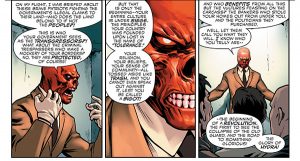 And, in America? Oh America… The Republican Party sold its soul to the lowest common denominator in the bitterness of the culture wars and now it has Donald Trump and the kind of extremism that seeks to build walls and ban entire religions from a nation that was built by economic refugees and religious fundamentalists. And, at the same time, armed groups of white extremists style themselves “militias” and are emboldened and the notion that the struggle for civil rights have been won is wounded with every young, unarmed, black man who is shot dead by police officers who never seem to face consequences.
And, in America? Oh America… The Republican Party sold its soul to the lowest common denominator in the bitterness of the culture wars and now it has Donald Trump and the kind of extremism that seeks to build walls and ban entire religions from a nation that was built by economic refugees and religious fundamentalists. And, at the same time, armed groups of white extremists style themselves “militias” and are emboldened and the notion that the struggle for civil rights have been won is wounded with every young, unarmed, black man who is shot dead by police officers who never seem to face consequences.
There’s nothing that the Red Skull says in Nick Spencer’s cleverly written speech that we haven’t heard from these modern demagogues. No words that haven’t convinced millions of people to support extremists all around the world. In making the Red Skull a real and genuine fascist – and a recognisable reflection of modern extremism – Spencer has at least demonstrated that he has a grip on what evil might actually look like. His reduction of Zemo and his “New Masters of Evil” to the butt of some humiliating joking only reinforces this point.
 Real extremism isn’t James Bond plans to conquer the world with superpowered henchmen, the “dust of death” or Cosmic Cubes, it’s the dispossessed, the stupid and the angry being seduced by easy answers to complex problems, blaming minorities for their misfortune and believing promises sold to them by shysters. And it’s the ability of those who lead them to persuade their followers to do almost anything – to commit any outrage and pay any price – that makes them far more dangerous than the silly plotting of most comic book villains.
Real extremism isn’t James Bond plans to conquer the world with superpowered henchmen, the “dust of death” or Cosmic Cubes, it’s the dispossessed, the stupid and the angry being seduced by easy answers to complex problems, blaming minorities for their misfortune and believing promises sold to them by shysters. And it’s the ability of those who lead them to persuade their followers to do almost anything – to commit any outrage and pay any price – that makes them far more dangerous than the silly plotting of most comic book villains.
My second reason for cautious optimism is that there is at least the hint that the book will take a reasonably sophisticated approach to what makes someone turn to extremism. It’s easy – indeed it is deeply comforting – to brand those who do horrible things as “naturally” evil. Many of the most viscerally angry responses to what Marvel and Spencer have done with this comic have been based on the idea that Steve Rogers could never be evil because he is – at his core – incorruptible. Their idea is that “heroes” are defined by an essential goodness and that only congenitally bad people support wicked causes.
But this is plainly nonsense. Even if we accept that there are those who are “born bad” (and I’m not sure I do accept that) then we have to accept that the nature of their badness is shaped by their surroundings, experiences and opportunities. No one is born a follower of Hitler or Stalin or Pol Pot – even if you believe they were born to take pleasure in killing. The ideology that such people follow depends on the context in which they are born and raised. One of the interesting things about the comic is that it is already flagging up that it understands this and, my guess is (and I have no inside knowledge, simply a hunch from the shape of the story), that this is going to be the key point as the story unfolds.
Like the suicide bomber in this issue, Steve Rogers grew up in poverty and near hopelessness. And the point that such conditions can make people susceptible to the false and dangerous promises of extremists is not just avowed by history (including American history), we can also see it all around us today. Poverty (especially poverty from which their seems to be no escape) and powerlessness (especially when faced with those who seem to exercise power without consequence or limit) creates desperation and makes it easier to justify extreme responses. And, let’s face it, Steve Rogers always had something of the obsessive about him – he’s worn that flag for 75 years, mostly, through thick and thin, he has punished himself and refused to bend when quitting would have been easier. Nothing defines the character so clearly as an absolute devotion to the ideology in which he believes.
But what he believes in is surely contingent on the society and people that shaped him.
Growing up in a community that was defined by extremist division, I’ve seen how little separates those who slip into committing horrific acts from those who do not. More than that, I’m very aware of how fundamentally random are the chances of birth and upbringing, opportunity and misfortune, that place us on one side of the fence or the other. The idea that Captain America could not be an extremist simply because he is Captain AMERICA belongs, at worst, to the kind of essentialism that feeds ultra-nationalism. The idea that the obsessive loyalty to a cause possessed by a character like Steve Rogers could not be corrupted, or that the only people who genuinely believe in their cause are those good people with whom we agree is, at best, hopelessly naïve.
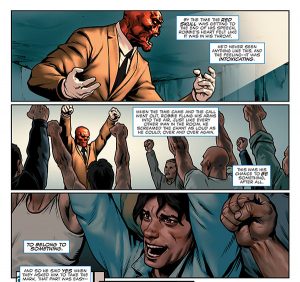 The way in which Spencer is allowing the manipulations of the time traveller/psychic/alien (or whatever) who is changing Steve Rogers’ history in this comic to redirect this soldier’s fierce loyalty from one ideology to another and changing the context in which he gets to express his basic nature is an approach that far better reflects the real world. This is far more interesting than pretending that a man, any man or woman, somehow stands apart from their history, their beliefs immutable and inviolable, making them a “hero” or a “villain”. We are, all of us, living lives that are contingent on an almost endless array of chance outcomes that define our politics and our moral outlook – our most deeply held articles of faith. There, as the saying goes, but for the grace of god…
The way in which Spencer is allowing the manipulations of the time traveller/psychic/alien (or whatever) who is changing Steve Rogers’ history in this comic to redirect this soldier’s fierce loyalty from one ideology to another and changing the context in which he gets to express his basic nature is an approach that far better reflects the real world. This is far more interesting than pretending that a man, any man or woman, somehow stands apart from their history, their beliefs immutable and inviolable, making them a “hero” or a “villain”. We are, all of us, living lives that are contingent on an almost endless array of chance outcomes that define our politics and our moral outlook – our most deeply held articles of faith. There, as the saying goes, but for the grace of god…
Third, let’s be clear, having this Captain America saying “Hail Hydra” is not an insult to Joe Simon, Jack Kirby or Stan Lee or any of the other Jewish creators who have shaped the history of Captain America. No one really believes that the ultimate lesson of this story is going to be “Nazis are not so bad really and, if it’s okay for Steve Rogers, all you readers should totally pull on your goose-stepping pants and get down with the world domination”. We’ve already had it clearly established that Hydra Steve Rogers is an “evil” Steve Rogers because, in the weakest part of the book, Spencer cheaply sacrifices a “good” character that has been reintroduced simply so we can be shocked at how nasty this Hydra-hailing Steve Rogers has become. “Evil” Steve Rogers is, without doubt, going to throw off this mind-control/altered reality/alien worm, or whatever, and become “good” Steve Rogers again and when he does he’ll punch the Red Skull, we’ll get a speech about how we have to be on our guard against extremism and things will, more-or-less, go back to normal. There’ll probably even be a panel where he stands in front of a Stars and Stripes, which will make those of us who are not American feel slightly uncomfortable.
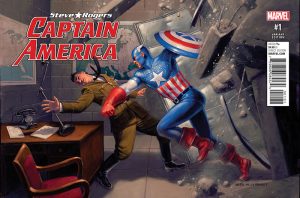 Simon and Kirby created Captain America to act as a warning of the threats of extremism at a time when most Americans were determined to ignore what was going on in the wars around the world. When this story arc has played out, I have absolutely no doubt that this core message – that far right extremists, are bad and should be defeated, probably through the medium of dramatically posed punching and squared-jawed Yankee grit – will be repeated and reinforced. Despite my fear of this simplistic outcome, I still hope that, given some of the writing so far, this series might actually deliver a well-managed, interesting and reasonably sophisticated approach to the topic, one that reflects the way that extremism works in the modern world.
Simon and Kirby created Captain America to act as a warning of the threats of extremism at a time when most Americans were determined to ignore what was going on in the wars around the world. When this story arc has played out, I have absolutely no doubt that this core message – that far right extremists, are bad and should be defeated, probably through the medium of dramatically posed punching and squared-jawed Yankee grit – will be repeated and reinforced. Despite my fear of this simplistic outcome, I still hope that, given some of the writing so far, this series might actually deliver a well-managed, interesting and reasonably sophisticated approach to the topic, one that reflects the way that extremism works in the modern world.
We do not live in the 1940s. Few of the threats we face from extremists today come in the form of people wearing recognisable symbols, stylish uniforms and ridiculous moustaches. Too many of those threats come from people within our own communities, from people who are indistinguishable from ourselves. It is entirely right that a story about the struggle against extremism its modern incarnation should be more complex and more troubling and require more thought than parachuting a guy in a gaudy uniform into Berlin to punch Hitler in the teeth. At least part of the issue Spencer seems to want to address is the way the “American dream” and American nationalism have been co-opted by people who sound disturbingly like his Red Skull. I’m certain Kirby and Simon would understand that very clearly – even if, perhaps, they would have not written the story in precisely this form.
And so, we come, at last, to my final point: that while the current treatment of Steve Rogers is controversial and not without weaknesses (did I mention how much I hated that lazy killing?) and possible pitfalls, it is not as wrong as the current transformation of Peter Parker into a billionaire businessman.
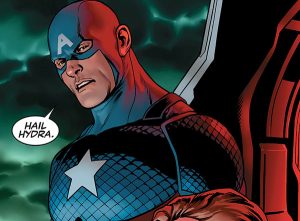 The treatment of Steve Rogers is, it appears, forming the foundation of a story that will explore and challenge the themes that have always driven the best incarnations of this character by placing them in a contemporary context. I’m hopeful, from what we’ve seen so far, that there is the potential for the story to do something interesting.
The treatment of Steve Rogers is, it appears, forming the foundation of a story that will explore and challenge the themes that have always driven the best incarnations of this character by placing them in a contemporary context. I’m hopeful, from what we’ve seen so far, that there is the potential for the story to do something interesting.
Meanwhile, Peter Parker is rich and flying around the world like a cheap imitation of Bruce Wayne. Peter Parker, whose character is shaped and defined crap luck, hardship and being the ordinary guy for whom the reader can feel empathy and sympathy. Peter Parker, who is supposed to be one of us. Now we’re watching him leaping out of Spider-planes and Spider-mobiles and Spider-spaceships and Spider-frigging-submarines (probably) as he hops from exotic location to exotic location. It has completely removed Parker from both his roots and from the core ideas that makes him a unique and interesting as a character.
Marvel has always been best when it’s creating blue collar and underdog heroes – Parker, Murdoch, Barton, Ben Grimm, Sam Wilson, Kamala Khan, a bajillion mutants and, yes, that stubborn product of Irish immigrants and Great Depression poverty: Steve Rogers. Marvel’s best characters have always been ordinary people, not billionaires, royalty or gods, with powers that were as much a curse as a blessing. Even when Stan Lee, Larry Lieber and Don Heck did create a billionaire hero they ripped out his heart to teach him a lesson. The last thing comics need is another do-gooding one percenter. Especially one whose name is Peter Parker.
So, when the blue cosmic cube girl/alien worm eater/Abraham Lincoln (or whatever it is that resolves this storyline) cures Steve Rogers of his desire to hail Hydra, let’s hope that Peter Parker gets turned back to being the loser he’s supposed to be too.

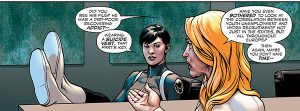
2 responses to “WHY SPIDER-MAN BEING RICH IS A WORSE TREATMENT OF AN ICONIC CHARACTER THAN CAPTAIN AMERICA HAILING HYDRA”
Make Captain America great again
No, no. Make Spider-man crap again!